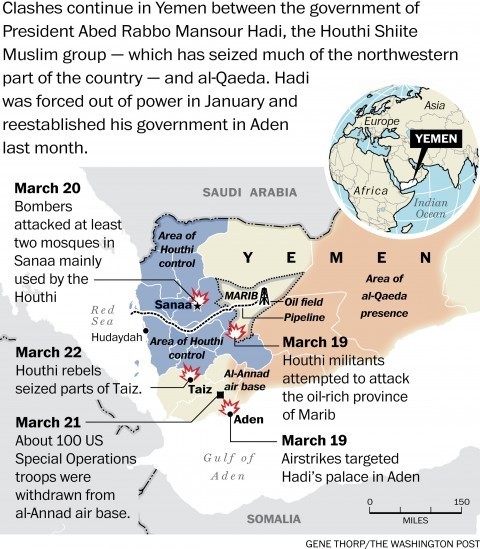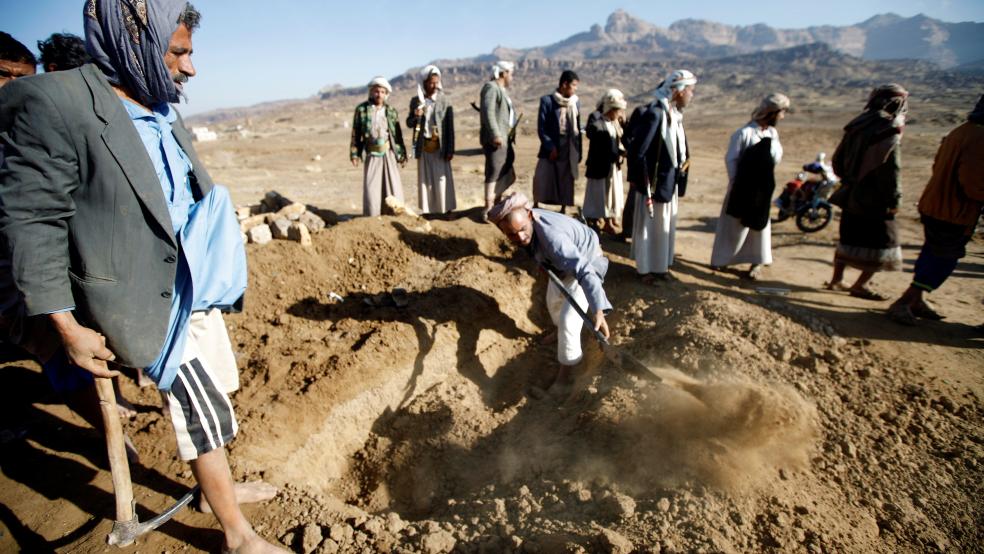Saudi Arabia launched airstrikes early Thursday in neighboring Yemen, heading a coalition of Arab nations in an effort to dislodge Houthi rebels sweeping through that country.
The strikes were a startling turn of events that came as the Houthis, in control of Yemen’s capital for months, barreled south toward the coastal city of Aden, seizing an air base along the way that was evacuated by U.S. Special Operations forces last week.
President Abed Rabbo Mansour Hadi, who had taken refuge in Aden after fleeing Sanaa, the capital, was said to have escaped. His whereabouts were unknown.
The military operation was announced in Washington by Saudi Ambassador Adel al-Jubeir, who said it would last until Yemen’s “legitimate government” was restored.
Jubeir said airstrikes began at 7 p.m. Washington time, conducted by Saudi Arabia, along with “partner nations in the Persian Gulf” and others, although he declined to specify any other participants. He said that some countries had already transferred military assets to Saudi Arabia and that others were on their way.

The United States was not involved in the offensive, he said. But the White House announced late Wednesday that President Obama had authorized U.S. forces to provide logistical and intelligence support to the operation. American forces were establishing a “Joint Planning Cell” with Saudi Arabia to coordinate military and intelligence assistance, the statement said.
Jubeir said the airstrikes had targeted sites around the country, including Sanaa. “The operations are limited to defending the government and preventing its collapse,” he said.
The gulf countries acted as Aden was close to being seized by the rebels, a victory that would give them control of the country’s main sea gateway.
Hadi has been a key ally of Saudi Arabia and the United States, which has depended on his government to support its efforts against Yemen-based al-Qaeda in the Arabian Peninsula. AQAP holds patches of the country and views the Houthis as foes in the competition for influence and Yemen’s modest oil wealth. U.S. efforts included training of Yemeni special operations forces and drone strikes launched from the al-Anad air base, about 35 miles from Aden.
On a broader level, Yemen represents a potential proxy battlefield for Shiite power Iran and the Sunni Gulf Arab states allied with Washington.
Houthi forces seized the al-Anad base this week and reportedly were already flying attack planes from there.
Saudi Arabia last launched military action in Yemen in 2009, conducting airstrikes against the Houthis near the Saudi border after it said its border guards had been fired upon.
Although the Saudis were also said to have massed ground forces along the border this week, any ground intervention would require a long and difficult trip through the heart of Houthi-held territory to reach Aden.
Hadi’s government had appealed for military intervention from the Gulf Cooperation Council, which is anchored by the Saudis and includes Kuwait, Oman, the United Arab Emirates, Bahrain and Qatar. In an emergency meeting last weekend, Yemen also called on the United Nations to authorize foreign armed forces to enter its territory.
Jubeir said that Saudi Arabia and its partners had made every effort to prevent violence but that those attempts had been thwarted by the Houthis. They are now “in control of ballistic missiles and heavy weapons,” in addition to Yemeni aircraft, he said.
Amid the widening chaos, Hadi’s whereabouts remained unclear. Senior Yemeni security officials told The Washington Post that Hadi had left his stronghold in Aden, where his government sought a foothold after being driven from Sanaa by the Houthis.
Looters swarmed the presidential buildings in Aden, and fighting flared on several fronts on the edge of the city, said Anis Mansour, editor of the port city’s Huna Aden newspaper.
“What is happening in Aden is an invasion,” Mansour said.
Yemen’s foreign minister, Riyadh Yaseen, told Al Jazeera from Egypt that Hadi was in a “secure” place in Aden. But later officials told the Associated Press that Hadi and top aides had escaped on two boats.
A senior member of the Houthi political committee, Dhaif Allah Alshami, denied that Hadi had slipped away by sea and said the rebels were seeking him in the city.
Alshami claimed the insurgents had taken over the compound where Hadi maintained his government after being driven from Sanaa. The deputy editor of the Almasdar news agency, Ali Alfaqeeh, said that the site has come under shelling and that there were no sign of Hadi’s forces mounting a counteroffensive.
In Washington, White House press secretary Josh Earnest strongly condemned the Houthi offensive and accused former president Ali Abdullah Saleh of working with the rebels “to foment a lot of instability in the country.”
“And so, we would call on them to stop that instability and that violence,” he said. Saleh was driven from power by Arab Spring-inspired uprisings in 2012 but has remained an important power broker in Yemen. Earnest said that the Obama administration still recognized Hadi as president.
He added that “there are elements of the Yemeni government that we continue to be in touch with” on counterterrorism operations aimed at the country’s al-Qaeda affiliate, but he did not provide details. He said he could not confirm Hadi’s location. But the White House statement issued Wednesday evening said that the U.S. government had been “in close contact with President Hadi and our regional partners.”
In Aden, shopkeeper Abduljabar Mohammed said the streets emptied as the rebel attacks intensified.
“I have been hiding in my shop,” he said by telephone. “The people are afraid and worried for their safety. We don’t know what to expect.”
Houthi-controlled state television said a nearly $100,000 bounty was being offered for the president’s capture.
Some members of Hadi’s inner circle, meanwhile, appeared to have run out of room. Rebels said they had captured the country’s defense minister and a top aide near Aden
[ Yemen’s collapse also sinks U.S. counterterrorism strategy]
Security officials told The Post that Hadi fled his compound just hours after the rebels announced that they had taken the al-Anad air base.
Later, the rebels reported taking control of Aden’s civilian airport.
The unraveling of Hadi’s power over the past months has dealt a significant blow to U.S.-led efforts to wage drone attacks and other pinpoint strikes against suspected strongholds of the Yemen-based branch of al-Qaeda, which is considered among the terrorist group’s most active networks. Meanwhile, the Houthi rebels have claimed increasing territory.
Last week, suicide bombers killed at least 137 people at two Shiite mosques in Sanaa in an attack linked to adherents of the Islamic State.
DeYoung reported from Washington. Brian Murphy in Washington contributed to this report.
Read more from The Washington Post:





